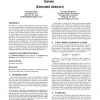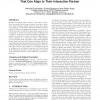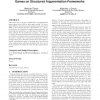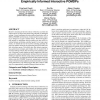ATAL
2010
Springer
14 years 22 days ago
2010
Springer
ATAL
2010
Springer
14 years 22 days ago
2010
Springer
Minimax-regret preference elicitation allows intelligent decisions to be made on behalf of people facing risky choices. Standard gamble queries, a vital tool in this type of prefe...
ATAL
2010
Springer
14 years 22 days ago
2010
Springer
Requirements Driven Agent Collaboration (RDAC) is a mechanism where the self-interested service agents actively and autonomously search for the required services submitted by the ...
ATAL
2010
Springer
14 years 22 days ago
2010
Springer
The Prometheus Design Tool (PDT) is a graphical tool that is used to design a Multi-Agent System following the Prometheus Methodology. This paper describes the latest version of P...
ATAL
2010
Springer
14 years 22 days ago
2010
Springer
ATAL
2010
Springer
14 years 22 days ago
2010
Springer
ATAL
2010
Springer
14 years 22 days ago
2010
Springer
Speakers in dialogue tend to adapt to each other by starting to use similar lexical items, syntactic structures, or gestures. This behaviour, called alignment, may serve important...
ATAL
2010
Springer
14 years 22 days ago
2010
Springer
This paper aims at giving a classification of argumentation games agents play within a multi-agent setting. We investigate different scenarios of such argumentation games that dif...
ATAL
2010
Springer
14 years 22 days ago
2010
Springer
A classic example of multiagent coordination in a shared environment involves the use of pheromone deposits as a communication mechanism. Due to physical limitations in deploying ...
ATAL
2010
Springer
14 years 22 days ago
2010
Springer
Recursive reasoning of the form what do I think that you think that I think (and so on) arises often while acting rationally in multiagent settings. Several multiagent decision-ma...





